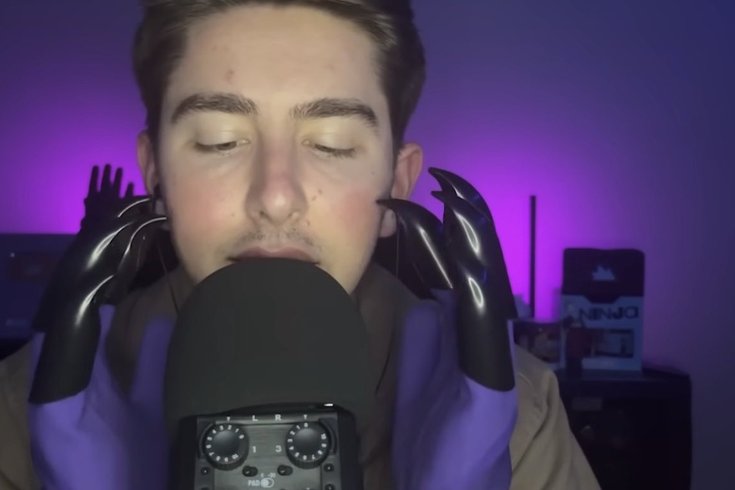
August 16, 2024
 Preston Watt/YouTube
Preston Watt/YouTube
Preston Watt, above, quit his job to make ASMR videos on a full-time basis. He says ASMR helps calm him down. Research suggests ASMR may help reduce stress and anxiety, but more studies are needed.
The perpetuating social media universe of people tapping surfaces, crinkling paper and whispering into microphones might seem bizarre to newbies. But many people experience what is called autonomous sensory meridian response, or ASMR, a "flow-like" mental state in which a tingling sensation trickles across the scalp and back of the neck while listening to or watching videos of people producing such noises.
Some ASMR content is clever, such as the chef who makes a Philly cheesesteak and fries, each step producing stimuli that some people find soothing.
Other content is funny, like the ASMR imitation of a Philadelphia barber, in which Pepe, an "artist passionate about creating relaxing and immersive experiences for (his) viewers," clinks clippers, sprays water, brushes hair and uses sheers.
ASMR has been churning online at least since 2007. In 2010, a woman named Jennifer Allen finally named the experience in a Facebook group. By 2019, the phenomenon had become so well know that it was the subject of a Super Bowl commercial. Five years after that moment, it's clear that ASMR is more than a passing trend, and there is some science to back it.
People widely report that ASMR reduces anxiety, induces relaxation and results in a sense of well-being, according to the National Institutes of Health. A 2023 literature review concluded that ASMR can reduce stress and anxiety, though it acknowledged more research is needed. Studies that measured physiological responses to ASMR showed it lowered heart rates and blood pressure. Neuro-imaging has revealed that ASMR activates brain circuits linked to stress relief and relaxation.
Viewers and creators say ASMR helps people easily find online mental health support for anxiety and insomnia – and even a sense of community. ASMR videos help center people, said James Lavino, a counselor and board-certified music therapist in the Philadelphia area.
"I think that part of ASMR is being able to regulate the physical self in a way that's calming," Lavino said. "'Come back to the present moment. Forget about what might be, what should be, the way things are supposed to be. And come back to the breath. Come back to the body.'... If it's (ASMR) having some deeper effect on the central nervous system or regulation, I can see how it would be something to people that wouldn't be merely trendy or faddish, but that would stick around," Lavino said.
One content creator, Preston Watt, said he was having trouble falling asleep while attending college online during the COVID-19 pandemic, so he began to watch ASMR videos for relief.
"I don't really know how to explain it," Watt said.
When he talks to people who don't follow ASMR, they think it's "weird." he said. But "if you do end up experiencing (tingles), it just feels really good and helps you fall asleep, just instantly putting you in a trance of relaxation," Watt said.
Because Watt found ASMR to be so satisfying, he decided about three years ago to join the movement. He threw some ASMR reels up on TikTok and then posted more videos to YouTube. The first to take off was one Watt made with his dad.
Now Watt, 22, who lives outside of Salt Lake City, has quit his job at a company that manufactures trophies and medals – including those for the 2022 Olympics – to make ASMR videos full-time. Last month, he garnered more than 8 million views and made $3,600 combined from TikTok and YouTube.
A whole ASMR creator universe exists where people become friends and collaborate on content – even flying to different countries to visit in person, Watt said.
"I met a lot of people, just co-hosting with them," he said. "For me, it's just very surface level. But a lot of people found best friends this way."
Finding company might be one of the keys to ASMR's enduring popularity, Watt said.
"I wonder if people who work from home, if they don't have a lot of people to talk to during the day … they might feel isolated, so hearing someone talk might be nice to them," Watt said.
ASMR is not for everyone. People who suffer from misophonia, which means hatred of sound, go into fight or flight mode when subjected to noises like chewing, yawning, breathing and other sounds that may not bother others. The ASMR practice of tapping, scratching and whispering can be disturbing, rather than soothing, to people with this sound sensitivity disorder.
Lavino said he does not personally respond to ASMR, but as a music therapist he knows that "sound has a way of impacting us in these deep, systemic, foundational ways. So even though we might not understand the mechanism (of ASMR) yet or how effective it is … it doesn't surprise me one bit that some people seem to respond to these sounds in a way that's significant and helps them to regulate their emotions or their bodies."
For Watt, ASMR has become a form of time-consuming therapy that pays him back, in both dollars and serenity.
"I talk a lot," Watt said. "I will whisper a lot into the microphone. I'm just rambling to nobody, just whoever's listening. And it calms me down … like, 'OK, I can go to bed now that I've gotten this off my chest' kind of thing."